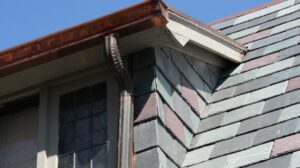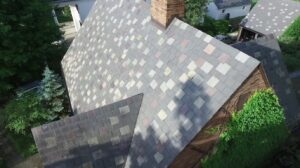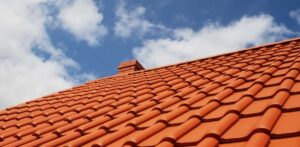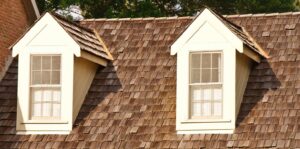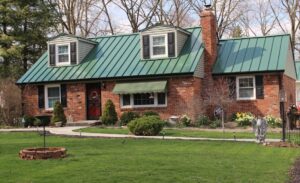Many homeowners and business owners value natural slate roofing for its strength, longevity, performance and aesthetics. It’s no wonder this material is prevalent in various structures, from historic properties to churches and upscale homes. But how does a slate roof hold up to weather?
If your home or business has a slate tile roof, you might wonder how well it will endure different weather conditions, such as rainstorms, wind, hail and snow. Learn all about this material’s durability and resistance to the natural elements in this guide.
What Is Slate Roofing Made Of?
Authentic slate roof tiles come from a natural material — hard, metamorphic rock. Natural slate roof tiles are sourced from quarries around the world. They come in a range of colors, shapes and thicknesses, depending on the source and processing technique. Some roof installation projects use a consistent tile color across the roof, while others combine slate from numerous sources for a unique blend of color and texture.
Due to the desirability of natural slate roofing, synthetic options are also available. These are typically made from materials like clay, concrete, ceramic and rubber to mimic the appearance of genuine slate. While faux slate tiles tend to cost less initially, they can’t rival the strength and longevity of natural slate. Synthetic slate will likely need to be replaced sooner, potentially making it more expensive in the long term.
The Benefits of Slate Roofing
Slate tiles have multiple advantages, making them a practical option for homeowners and business owners seeking quality roofing materials:
- Energy efficiency: Because natural slate is so heavy and dense, it can help reduce your home’s or business’s heating and cooling bills. It can keep your space cool during warmer months, preventing hot air from entering the interior. Similarly, slate tiles can keep your building warm during colder seasons.
- Eco-friendliness: Slate is a naturally occurring material that requires minimal processing, unlike other roofing materials such as asphalt. This makes slate tiles a sustainable option for your home or workplace.
- Versatility: Slate roofing comes in a variety of styles, colors and textures, making it easy to complement the aesthetic of your residential or commercial space.
How Durable Is Slate Roofing?
A natural slate roof’s durability is truly unmatched. As one of the most robust materials on the market, slate can hold up well against heavy-duty storms, including heavy rains, strong winds and hail.
Slate is naturally dense and can effectively moderate temperature in both warm and cold seasons. During spring and summer, the material can retain cool air and prevent hot air from entering. Likewise, it can keep cool air out and trap heat during chillier months, keeping your home or business warm and comfortable.
Additionally, slate is one of the most heat- and fire-resistant roofing materials. It offers ample protection against the spread of flames and toxic smoke.
Impact from an intense hail storm or falling tree may damage slate tiles, but they aren’t nearly as vulnerable as other materials like asphalt shingles. While slate roofing may come with a price tag, you’ll likely find that its durability and other benefits save you money in the long haul.
What Is the Average Slate Roof Life Span?
When installed and flashed properly, natural slate roofing can last 100 years or longer. Chances are, it will be the last roof you install on your home or business.
Factors Affecting Slate Roofing Durability
While slate is an inherently strong roofing material, certain variables can impact its durability:
1. Installation Quality
To ensure optimal strength and longevity, it’s wise to have your roof installed by a qualified professional with substantial slate roofing experience. A skilled roofer with proper training will employ effective materials and techniques to yield a durable, long-lasting roof. Additionally, slate tiles can be incredibly fragile before they’re laid and sealed. A reliable roofing contractor will handle them with caution and care to avoid breakage.
2. Maintenance
Every roof requires ongoing care, inspections, cleaning and maintenance to maximize its life span and durability. Slate tiles are no exception.
For instance, a broken or missing slate tile creates an opening in the roof that allows rainwater or snow to seep in. Over time, this accumulated moisture can damage the roof’s structural integrity. It can even leak into the building’s interior, damaging ceilings, walls and insulation.
Your roofer should periodically inspect vulnerable areas, perform routine preventive maintenance measures and fix damaged tiles when necessary.
3. Foot Traffic
Just like slate tiles should be handled carefully before and during installation, they should be cared for afterward, too. Frequent foot traffic on your roof can accelerate wear and increase the likelihood of a broken tile.
Only professionals who know how to maneuver around the surface without damaging the tiles should be up on the roof. Replacing slate tiles can be a costly and time-consuming job, so it’s important to take precautions wherever possible.
4. Climate and Weather Conditions
Different regions are prone to different weather conditions, so your local area and weather patterns may also influence your slate roof’s durability. While slate roofs tend to perform well in most climates, they may require additional maintenance measures in more intense conditions. In areas that see frequent or heavy rainfall, high winds, snow and extreme temperatures, slate roofs may wear out sooner.
For example, states like Texas, Nebraska and Kansas encounter frequent hailstorms, especially from April through June. As such, a slate roof in these areas might be more susceptible to storm-related damage.
5. Material Quality
Besides the quality of the installation work, the quality of the material itself will affect the roof’s strength and life span. Your roofing contractor should use dense, durable and weather-resistant slate that will outlast lower-quality alternatives.
6. Roof Pitch
Your roof’s slope can determine how well it sheds water and snow. A steeper pitch can help prevent water penetration, ultimately extending your roof’s longevity.
7. Structural Support
Your home’s or business’s structural integrity can also impact the slate roof’s durability. A strong, well-maintained building helps uniformly distribute the slate tiles’ weight, helping prevent sagging and other issues.
Ensure Durable Slate Roofing With Our Expert Maintenance Services
Professional servicing and maintenance are essential to ensure a durable, long-lasting slate roof. Cornett Roofing Systems has over three decades of expertise in comprehensive slate roof services. Serving Ohio, Indiana and Kentucky, we’re the region’s trusted experts for slate roofing installations, inspections, repairs and replacements.
You’ll experience several benefits from working with our fully licensed and insured roofing specialists, including:
- Free, no-obligation service estimates.
- Lifetime warranties on slate, metal and tile systems.
- Access to the highest-quality roofing materials.
Whether your building needs a new roof or you’re looking to repair your existing one, our team is ready to assist you. Contact us online or call 888-307-7087 to schedule a free project estimate today.

